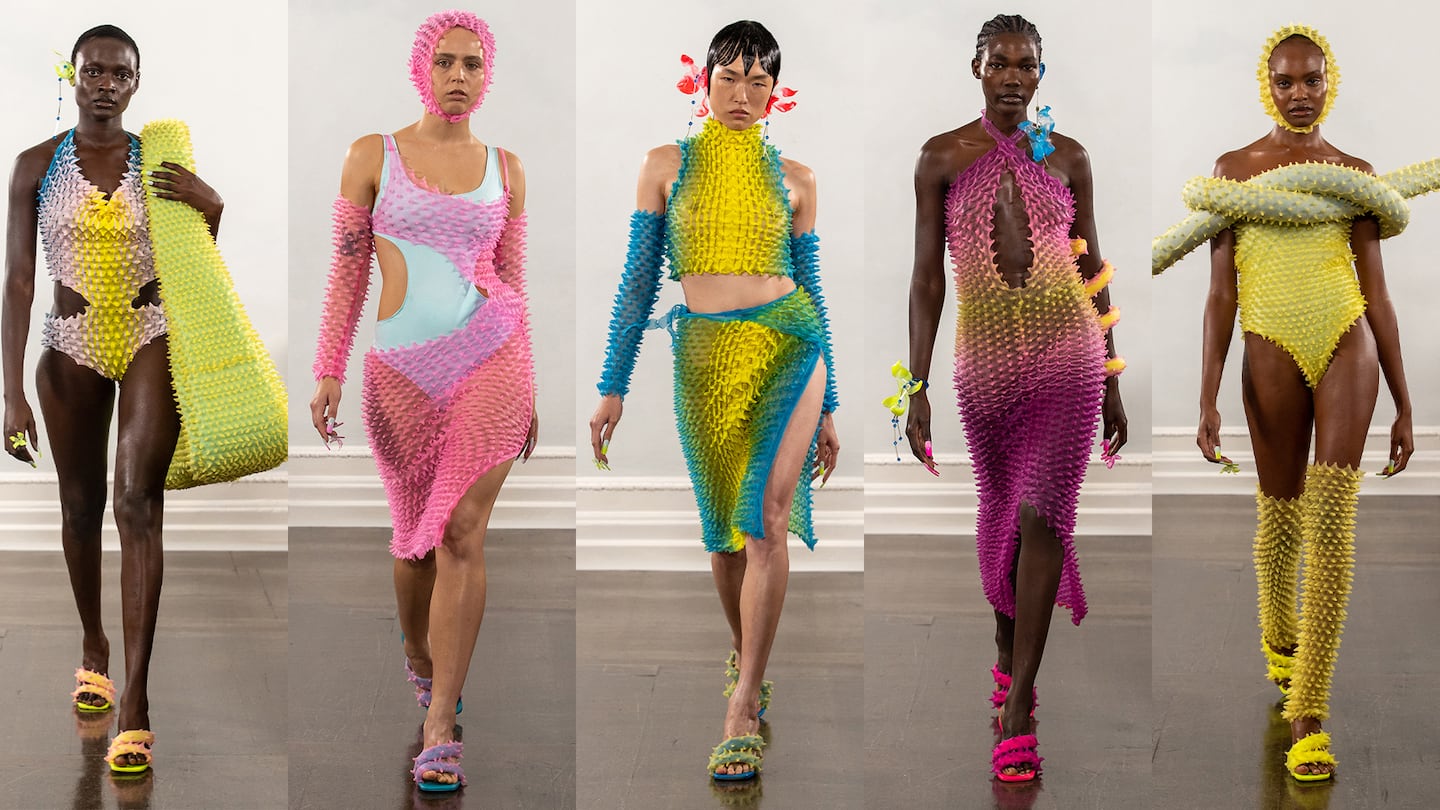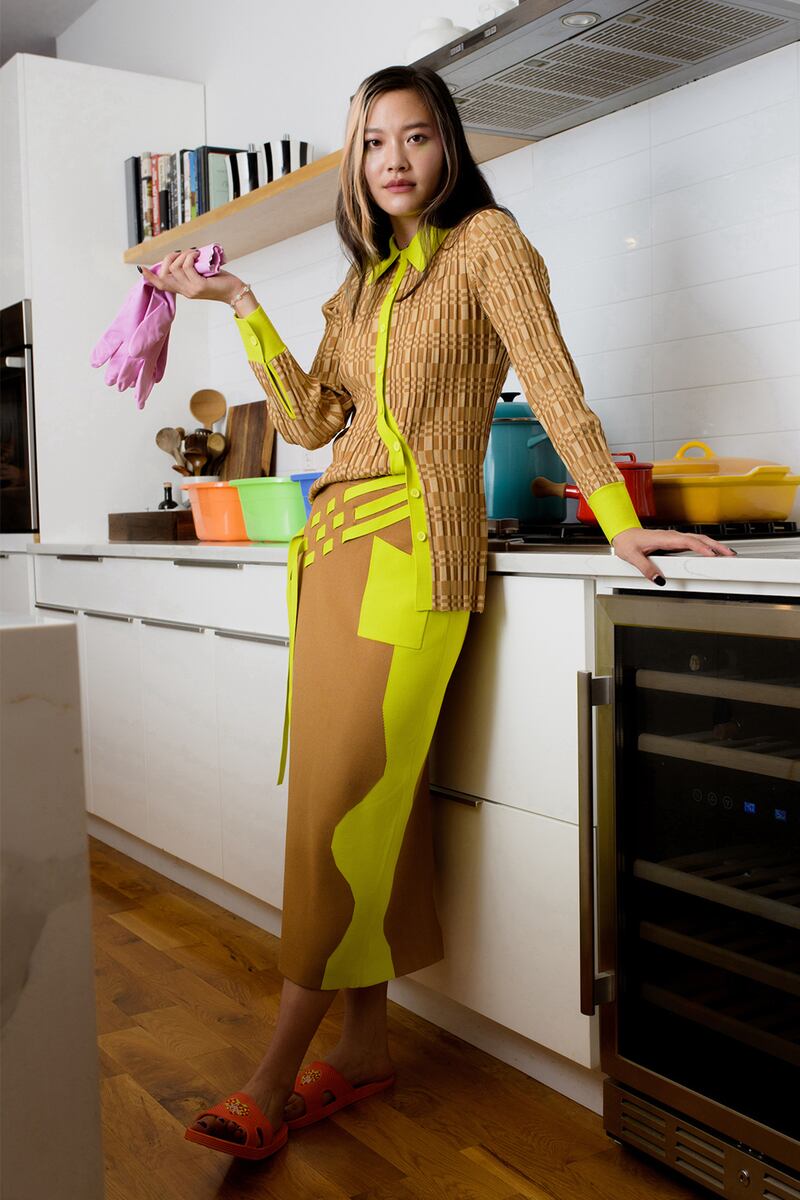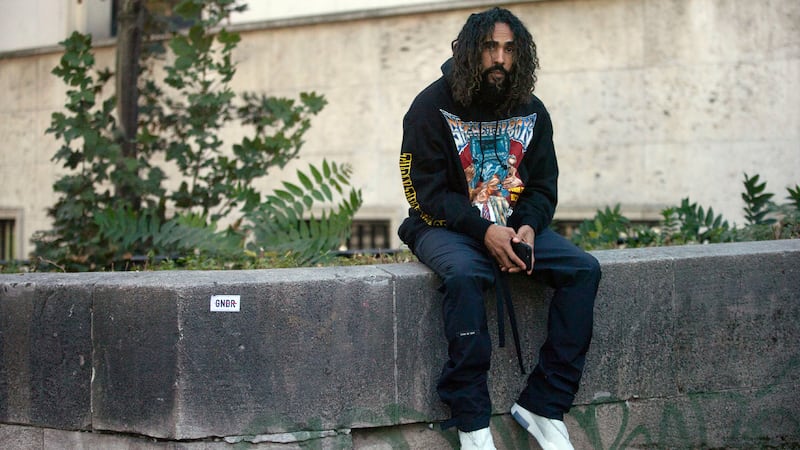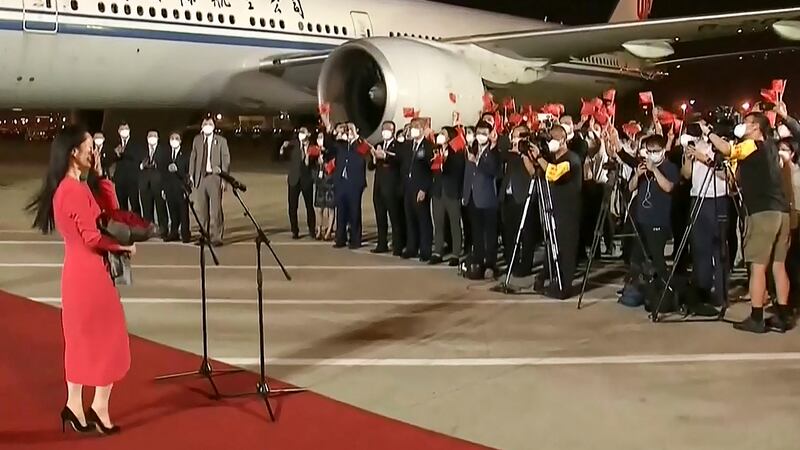
The Business of Fashion
Agenda-setting intelligence, analysis and advice for the global fashion community.

Agenda-setting intelligence, analysis and advice for the global fashion community.

After graduating from London’s Central Saint Martins amid 2020′s pandemic-induced upheaval, Chinese-American designer Chet Lo began to doubt whether he’d see his creations sported by models strolling down a runway any time soon.
“Graduating then, I had almost zero job prospects because the industry was suffering so much,” he recalled.
But fresh from an acclaimed debut at this year’s London Fashion Week show hosted by incubator platform Fashion East — presenting his signature spiky knitwear technique in 1990s anime-inspired fluo and candy-coloured hues, by way of halter-neck dresses, mini skirts and oversized bags — Lo is among a new crop of Chinese up-and-coming designers mapping out their post-pandemic strategies to reflect their generations’ new global zeitgeist.
Years after the likes of Shushu/Tong and Angel Chen put Shanghai on the fashion map, this season is shining the spotlight on designers like London-based Lo as well as New York-based knitwear label PH5 and Hermès-backed Shang Xia’s upcoming Paris runway debut by newly appointed creative director Yang Li.
ADVERTISEMENT
What these designers and brands share is an increasingly global, yet niche identity, something making many in the wider industry sit up and notice. “[Fashion week organisers are] saying, ‘We need this, we need something different,’ and they’re inviting these brands to show,” said Ida Petersson, buying director for London-based luxury retailer Browns. “They’re recognising the uniqueness and excitement that are coming from these designers.”
Global Ambitions
When Shanghai began capturing the attention of global buyers a few years ago, local up-and-coming designers made a clear commitment to the city, and the country, as an emerging fashion hub. It was a powerful statement. “We saw this talent, and we saw people having the confidence to not base themselves in Europe or the US and [instead] reach the world from their home country,” said Petersson.
Fast forward to today, the lion’s share of young Chinese brands are based in Shanghai, which often doubles as their manufacturing base and biggest market. It’s also where Covid-19 travel restrictions leading local buyers to pivot their budgets toward homegrown brands.
Yet a minority of brands are aiming to push the boundaries of what it means to be a designer with roots both at home and in their adopted cities abroad. It is a new balancing act, one that acknowledges that having a foothold in the West while keeping close ties to the mainland could hold the key for these brands to flourish.
The challenge isn’t lost on Wei Lin, Chinese-born founder and chief executive of knitwear company PH5.

Lin, along with co-founder and designer Zoe Champion, have built a brand centred around its community in New York, while working closely with a knitwear mill owned by Lin’s mother in Dongguan, China.
“It’s beyond the physical location and more about what it means to be a New York brand,” said Lin.
ADVERTISEMENT
For sure, the pandemic has put PH5′s community approach to the test, requiring a hefty dose of pragmatism. When travel restrictions meant Lin (currently in Shanghai) and co-founder and designer Zoe Champion (currently in Sydney) couldn’t physically show in New York’s Fashion Week, they presented their latest collection via lookbook, helping their Autumn/Winter 2021 sales increase 41.5 percent from the previous season.
Though China is PH5′s biggest market and manufacturing base, Lin remains committed to growing the brand’s presence in the US, where discussions around sustainability and diversity have helped shape the brand’s goals and business model — topics that are less widely discussed in China, Lin noted.
“We were never trying to be the number one brand in China,” she said. “Our goal has and will always be to be the number one brand in knitwear [globally].”
Finding a Balance
Another Chinese designer looking to combine the best of the mainland and her adopted global community is Paris-based Didu, whose graphic, futuristic and texturally playful looks have captured a growing band of followers and recently outfitted the likes of actor Timothée Chalamet and Blackpink’s Lisa.
Didu is showing on schedule in Paris with a view to tapping into a creative community that its founder and creative head, Di Du, discovered when studying in Antwerp.
The brand has in previous seasons shown collections off-schedule in Shanghai and Paris. But this season Du opted against showing on schedule in Shanghai, where she feels more brands have less control over their venues and production.
In Paris, the upcoming collection, which will be showcased in a film shot on a ranch, has an emphasis on technical fabrics, flowing silhouettes and cowboy accents.
ADVERTISEMENT
“Paris is the fashion week we value the most,” said business manager Laura Darmon, who along with Du is currently in Shanghai and is also the buying director at Shanghai concept store End.
Since founding the company in 2019, Du’s plan has been to grow in the West before targeting China. But recent months have brought a new twist to that strategy.
The brand is juggling its mounting success in China, where it has been featured on the pages of local editions of Vogue and Elle, as its profile in Europe rises. The goal with this season’s presentation on Sept. 29 — managed by an on-site team — is to expand Didu’s European presence (with a focus on department stores).
The ultimate goal is to be based in both Shanghai and Paris, but for different purposes. Du sees Shanghai more as a strategic base for overseeing production in the mainland and building on the brand’s growth, while maintaining Paris as its spiritual home. “We already have our base, our origins in Paris,” she said.
‘A Very Brand New Challenge’
Petersson is seeing a growing openness among Browns’ local customer base in London to explore emerging talent, including from China — an openness made all the more apparent by the lack of global tourists in London.
The growing interest is welcome of course, but for Lo, who started his business direct-to-consumer and made-to-order, the big question now is how to grow his operations economically to fulfil larger wholesale orders, while also getting to grips with managing the nuts and bolts of PR and production. Having taken on new stockists, he now needs to work with bigger factories.
For a designer who started out selling made-to-order pieces through Instagram, it’s a dramatic shift in many ways. While Lo’s main markets are the UK and US, sales in China are catching on. He’d love to show in Shanghai one day but currently lacks the contacts and social media presence in the mainland, where apps like Instagram are less accessible.
“It’s scary,” said Lo. “We’re starting to grow in that way which is a very brand new challenge.”
For sure, for all design upstarts, getting the exposure and big break is one thing; using the momentum to run a business is another entirely. But when it comes to Chinese brands, observers like Petersson are optimistic about their ability to rise to the challenge. Having worked closely with several, she cited a strong commercial instincts, particularly when it comes to range planning and pricing products.
“It’s something that doesn’t always happen with young designers,” Petersson said. “That confidence that you see generally much later is already there on display.”
时尚与美容
FASHION & BEAUTY

Jerry Lorenzo to Co-Curate Innersect 2021
Shanghai’s annual streetwear convention will team up with the LA-based Fear of God founder for its upcoming edition running Dec. 10-12, marking its first appointment of a co-curator. Besides helping shape the event’s line-up of guest designers, talks and drops, Lorenzo will launch an immersive branded experience featuring the Fear of God’s core line alongside its Essentials label and Adidas partnership. A previous Innersect event in 2019 attracted 66,000 visitors over three days. (Fear of God press release)
Vogue China Launches Gen-Z Friendly Supplement
The bi-monthly print edition, called Vogue+, is designed for a young audience and replaces Vogue Me, the sister publication to Vogue China that former editor Angelica Cheung launched in 2016 for a Millennial readership. The first edition of Vogue+, whose Instagram says it is “a platform for the collective ‘us’ over the lone ‘me’ or ‘you,’” was guest-edited by actor Timothée Chalamet. This spring, Margaret Zhang joined Vogue China as editor-in-chief following Cheung’s exit. Lily Chou, former Vogue Me editor and founder of Rouge Fashion Book, is said to be the head of the Vogue+ project. (BoF)
科技与创新
TECH & INNOVATION
ByteDance Reportedly to Launch Cross-Border E-Commerce Platform
Chinese media outlet The Passage reported that the firm, which owns Tiktok and Douyin among other apps, is set to launch an e-commerce app for international consumers in October. The venture would be Bytedance’s attempt to compete against AliExpress, Alibaba’s B2C marketplace that sells China-made products to customers based outside the mainland. According to 36Kr, AliExpress is China’s largest cross-border e-commerce player, covering over 200 markets and serving more than 150 million users outside China. (Technode)
Amid Manufacturing Labour Shortage, Investors Bet on Logistics Robots
Hai Robotics, a Shenzhen-based maker of autonomous, case-handling robots for warehouses, has raised $200 million from two separate equity rounds. The funding follows that of fellow robotics company Syrius, which raised $20 million in a Bytedance-led Series B round announced in August. These follow calls from Beijing for Chinese companies to increase efficiency as the country’s manufacturers grapple with a labour shortage. According to Logistics IQ, the global warehouse automation industry is predicted to reach $30 billion by 2026 from $15 billion in 2019. (Techcrunch)
消费与零售
CONSUMER & RETAIL
JNBY Group Boycotted for Inappropriate Childrenswear Designs
Chinese fashion group JNBY is facing outrage on social media and boycotts due childrenswear deemed inappropriate. Consumers took to the internet to accuse the Hangzhou-based group’s kidswear brand Jnby by JNBY of creating designs and campaign imagery with undertones of paedophilia, Satanism and violence. Though some observers have come to the brand’s defence, saying that the imagery was taken from artworks and dark cartoons, the company issued an apology and removed the offending products. However, the boycott continued for several days as other controversial imagery from the company came to light. JNBY’s share price was down 27.68 percent on market close on Monday. (Queennie Yang for BoF)
No Pre-Pandemic Rebound for China’s Mid-Autumn Holiday Travel, Spend
During this year’s three-day Mid-Autumn Festival, 88.15 million domestic trips were made, or 87.2 percent of such travel recorded during the respective period in 2019, according to official figures. Meanwhile, domestic tourism revenue reached 37.15 billion yuan (around $5.8 billion), amounting to 78.6 percent of 2019 levels. The latest figures were largely due to sporadic Covid-19 outbreaks in China, including in Fujian province, where the government encouraged residents to stay at home. (Queennie Yang for BoF)
Alibaba Doubles Down on Promoting ESG, Common Prosperity
Alibaba’s corporate responsibilities now include environmental, social and corporate governance (ESG) and “common prosperity.” following the retail company’s announcement this month that it would invest 100 billion yuan ($15.5 billion) to help reduce wealth inequality in China. The move, in line with President Xi Jinping’s recent calls to address China’s wealth gap, involves making Alibaba’s digital technology more accessible to rural communities and a net-zero plan to further China’s dual carbon goals, among other steps. Against that backdrop, CEO Daniel Zhang told the World Internet Conference in Wuzhen on Sept. 26 that the company “over the next five to 10 years — or longer” will lean on the company’s technologies to “help solve important problems facing society.” (Alizila)
政治、经济、社会
POLITICS, ECONOMY, SOCIETY

Huawei CFO Meng Wanzhou Returns to China
Huawei’s chief financial officer left Canada and headed to Shenzhen after making a deal with the US Justice Department to suspend the fraud charges made against her. This puts an end to her three-year house arrest. After her arrest at Vancouver airport in December 2019, Meng was indicted on bank and wire fraud charges, allegedly misleading UK-based bank HSBC regarding Huawei’s activities in Iran. The recent deal means that Meng’s prosecution will be deferred until December 2022 and dropped entirely if she complies with certain obligations, one of which stipulates that she must refrain from contradicting a statement of facts she signed before authorities. (The Guardian)
Enhanced IP Legislation in China Opens Floodgates for Lawsuits Against Foreign Firms
Ongoing intellectual property-related disputes lodged in the mainland, embroiling the likes of Muji-owner Ryohin Keikaku and Apple, are a sign that the tables are turning, after years of non-Chinese companies accusing Chinese parties of IP infringements. The change follows a move by Chinese officials in 2019 and 2020 to revise the country’s trademark, patent and copyright laws. Now, the more robust legislative framework is one of the main reasons for the number of IP-related lawsuits filed in China last year more than tripling since 2016. (FT)
China Decoded wants to hear from you. Send tips, suggestions, complaints and compliments to our Shanghai-based Asia Correspondent casey.hall@businessoffashion.com.
With consumers tightening their belts in China, the battle between global fast fashion brands and local high street giants has intensified.
Investors are bracing for a steep slowdown in luxury sales when luxury companies report their first quarter results, reflecting lacklustre Chinese demand.
The French beauty giant’s two latest deals are part of a wider M&A push by global players to capture a larger slice of the China market, targeting buzzy high-end brands that offer products with distinctive Chinese elements.
Post-Covid spend by US tourists in Europe has surged past 2019 levels. Chinese travellers, by contrast, have largely favoured domestic and regional destinations like Hong Kong, Singapore and Japan.